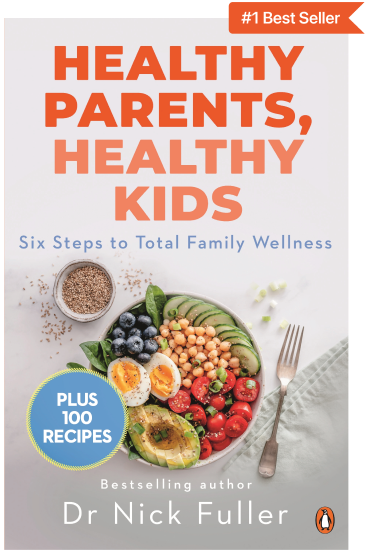How to Create Nutrition Plans for Picky Toddlers Stress-Free

Dr Nick Fuller
Leading Obesity Expert at the University of Sydney and founder of Interval Weight Loss.

Getting a picky toddler to eat well isn’t just about patience; it’s about strategy. When their idea of a balanced meal is crackers and air, how do you make sure they’re actually getting the nutrients they need?
According to research, between 6% and 50% of toddlers exhibit picky eating behaviours, with some phases lasting up to three years. While it’s a normal part of development, making sure they get the right nutrients is key to their growth, brain function, and overall health.
A well-balanced nutrition plan can help ensure they get what they need while respecting their preferences (and your sanity). This guide breaks it down step by step, so you can ditch the mealtime battles and focus on making food fun and stress-free.
Struggling with Nutrition Plans for Picky Toddlers? Here’s Help!
Feeding a picky toddler can feel like an ongoing challenge. Healthy Parents, Healthy Kids by Dr Nick Fuller, a trusted childhood nutrition expert, provides practical strategies to create balanced meals that even the fussiest eaters will enjoy.
Discover how to nourish your toddler without resorting to separate meals. With Healthy Parents, Healthy Kids, you’ll make mealtimes easier while keeping their nutrition on track. Grab your copy today!
What Do Toddlers Really Need to Eat?
Toddlers are tiny powerhouses of energy, which means they need a mix of nutrients to fuel their growth, brain development, and all that endless running around. Research suggests that toddlers aged 2-3 years need approximately:
- 1,000 to 1,400 calories per day (depending on activity levels)
- 30-40% of daily calories from healthy fats for brain development
- 13 grams of protein per day for muscle and tissue growth
- 700 mg of calcium for strong bones
- 7 mg of iron to prevent deficiencies and support brain function
Since toddlers have small stomachs but high energy needs, they thrive on nutrient-dense foods. Think whole grains, lean proteins, dairy (or alternatives), fruits, veggies, and healthy fats like avocado. Iron, calcium, and vitamin D are also crucial at this stage, so making sure they get a variety of foods is key.
Easier said than done, right? That’s where a nutrition plan comes in.
Easy Steps to Make Nutrition Plans for Picky Toddlers
When making a nutrition plan for a picky toddler, start with what they love and slowly mix in new foods. The key is balance—pair familiar favourites with nutritious options so they feel comfy while trying something new. Keep it simple, fun, and stress-free, and mealtimes will be way smoother.
Assess Your Toddler’s Nutritional Needs
Begin by checking what they’re actually eating. Keep a food diary for a few days to see if they’re getting a decent mix of nutrients. If they’re surviving on toast and air, it might be time to tweak things.
Studies show that iron deficiency affects up to 20% of toddlers in industrialised countries, often due to a lack of iron-rich foods like lean meats, beans, and fortified cereals. Checking for gaps in their diet can help prevent deficiencies before they become a bigger issue.
Compare your toddler’s intake to the Australian Dietary Guidelines. You don’t need to obsess over numbers, but having a rough idea of what’s missing can help you plan better meals.
If there are still gaps in their diet, nutritional supplements can help. Check out these options for your picky toddlers.
Know Your Toddler's Preferences and Dislikes
Some toddlers love bananas but gag at the sight of broccoli. Knowing what they naturally enjoy and what they completely reject gives you a solid starting point.
Research suggests that it can take 8-10 exposures to a new food before a toddler accepts it. So just because they refuse something once or five times doesn’t mean it’s a lost cause!
Try offering similar textures or flavours when introducing new foods. If they love mashed sweet potatoes, mashed carrots might be an easier sell. It’s all about working with their tastes, not against them.
Create a Structured Meal and Snack Schedule
Toddlers love routine, and that includes eating times. Set regular meal and snack times to prevent constant grazing, which can ruin their appetite for real meals. A predictable schedule also helps regulate their hunger cues, making them more likely to eat what’s offered instead of waiting for a snack 10 minutes later.
Involve Your Toddler in Meal Planning and Preparation
Let them pick between two food options, help wash veggies, or stir ingredients. Giving them a sense of control can make them more willing to eat what’s on their plate.
Even simple tasks like choosing a plate or adding a topping can make mealtime feel more like a fun activity than a chore. Research shows that kids involved in food prep are more likely to try new foods and develop a positive attitude toward eating.
Gradually Introduce New Foods
No need to overhaul their diet overnight—slow and steady wins the race. Introduce one new food at a time alongside familiar favourites so it doesn’t feel like a complete shock.
You can also play around with different preparations. If they hate raw carrots, try steaming or roasting them for a new texture.
Make Meals Visually Appealing
Toddlers eat with their eyes first, so presentation matters. Use fun shapes, colourful foods, or creative plating to grab their attention.
Research has found that kids are more likely to eat fruits and vegetables when they are arranged in fun, visually appealing ways. Even something as simple as arranging fruit into a smiley face can make a big difference in getting them to take that first bite.
Ensure a Non-Pressurised Eating Environment
The more pressure you put on them to eat, the more they’ll resist. Instead of forcing bites, create a relaxed environment where they can explore food at their own pace.
Pressuring kids to eat actually reduces their willingness to try new foods. Offer food without making a big deal out of it. If they refuse, stay neutral—no bribing, begging, or guilt-tripping.
Keep Offering New Foods Without Pressure
Just because they rejected peas today doesn’t mean they’ll hate them forever. Keep offering new foods regularly, but without any pressure to eat them.
Sometimes, it takes several tries before a toddler accepts a new food. Repeated exposure (without making a fuss) can help them warm up to it over time.
Monitor Progress and Adjust as Needed
If your current approach isn’t working, tweak it. Maybe they prefer finger foods over spoon-fed meals, or they eat better at lunchtime than dinner.
Be flexible and adjust your strategy based on what works best for your toddler. Consistency is key, but so is adapting to their changing preferences.
Consult a Pediatric Nutritionist if Necessary
If your toddler’s picky eating is extreme—like refusing entire food groups or showing signs of nutritional deficiencies—it’s worth seeking professional advice.
A pediatric nutritionist can help identify any underlying issues and provide personalised strategies to ensure they’re getting the nutrients they need. About 25-45% of young children have feeding difficulties, so if mealtime struggles feel beyond normal, professional guidance can help.
Want more tips on planning meals for your picky kids? Check out this article for ideas that make mealtime easier and way less stressful!
Final Thoughts
Feeding a picky toddler doesn’t have to be a daily struggle. With a solid nutrition plan, structured mealtimes, and a little creativity, you can make mealtimes smoother and maybe even fun.
The key is patience, consistency, and a low-pressure approach. Keep offering nutritious foods, make meals visually appealing, and let your toddler take the lead—one bite at a time.
Get the latest tips, pro strategies, exclusive offers, and all the support you need!
Meet Dr Nick Fuller
My Story
As a father, I know first-hand that raising healthy and happy children is tricky. Children are fussy, particularly at the end of the day when they are shattered. We also live in a society where companies seek to profit from what we feed our kids; incorrect and damaging advice is pushed on us and marketed towards our children, and we have no time.
But with these recipes and resources, you and your children can enjoy simple and well-founded food and lifestyle choices for lifelong health.

About Dr Nick Fuller
Dr Nick Fuller is the founder of Interval Weight Loss and is a leading obesity expert at the University of Sydney with a Ph.D. in Obesity Treatment. Dr Fuller is also the author of three best-selling books and his work been published in top ranked journals in the medical field, including JAMA, Lancet and American Journal of Clinical Nutrition.
